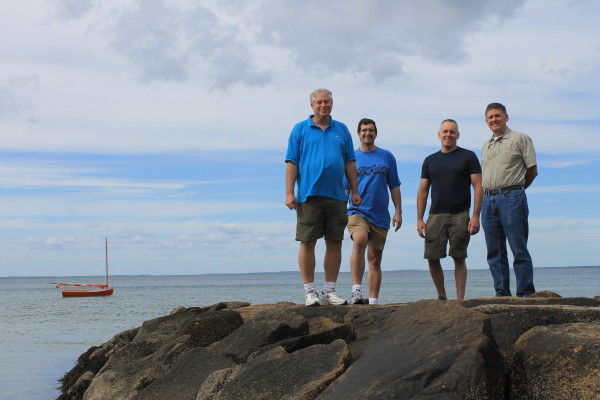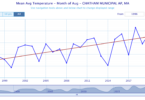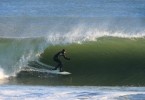WOODS HOLE – “The ocean is changing,” said Scott Doney, senior scientist at the Woods Hole Oceanographic Institution and the principle investigator on a just-launched three-year study of how climate change will affect Buzzards Bay, as well as affect the fishing industry in Southern New England.

Senior Scientist Glen Gawarkiewicz, Senior Scientist Scott Doney, Associate Scientist Jeff Donnelly, and Senior Scientist Dan McCorkle. The four have received a $1 million grant from the MacArthur Foundation to study climate change. Buzzards Bay, a focus of the project, is behind them.
The project, which has a specific goal of engaging communities about expected impacts, has been awarded a $1 million grant from The John D. and Catherine T. MacArthur Foundation to develop science-based climate change adaption solutions for coastal communities.
“We were trying to find a place with an intersection of climate change, water quality issues, and sea level rise,” said Doney. The multi-pronged study will follow changes in climate and sea level; coastal water quality and ocean acidification in Buzzards Bay; and the effect of ocean warming on the fishing region from Long Island to Martha’s Vineyard.
The project includes the partnering of scientists with organizations such as the Buzzards Bay Coalition and the Commercial Fisheries Research Foundation and others to help communities anticipate change and prepare to adapt.
“By working with these partners, once we look at the science, we’ll find out, does this provide a basis for them to try to argue for changes in how we’re treating the ocean?” said Doney..
“One of the things we argue is that much of what we will learn from Buzzards Bay is probably applicable to lots of the East Coast,” said Doney. “We’re focusing here because we can basically shine a bright light on it, and hopefully understand what’s going on.”
“My job as a scientist is to inform decision makers,” said Doney. “That is everyone from individual homeowners deciding whether to buy a house, to business owners, to local government.”





























